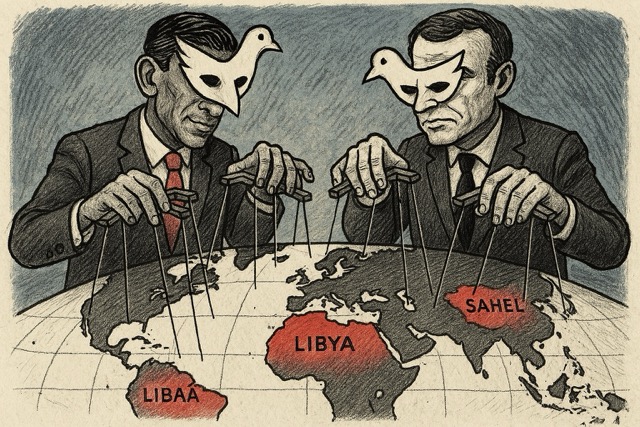They ruled Africa, divided the world, and now sell peace while fueling war. The UK and France haven’t changed — they just changed clothes.
1. From Enemies to Allies
For centuries, Britain and France were locked in conflict — from the Hundred Years’ War to Napoleon, from colonial rivalries to economic espionage. But in 1904, something shifted: the Entente Cordiale was born. No longer enemies, the two most aggressive colonial powers in Africa became partners. It was less about friendship than strategy — a move to contain Germany and preserve their global influence.
The alliance endured. Through two world wars, the carving of the Middle East, the Cold War, NATO, the UN, and now the EU-NATO hybrid power structure — Britain and France, despite public disputes, have moved in eerie sync. They may pretend to disagree, but when it comes to shaping conflict, they consistently show up on the same side.
2. The Colonial Glue: Africa and the Axis of Superiority
The UK and France didn’t just colonize Africa — they divided it, exploited it, and left it broken. Yet somehow, they’ve managed to recast themselves as the moral conscience of Europe. In their narrative, colonial crimes are distant mistakes, while today’s interventions — in Libya, the Sahel, Ukraine — are acts of civilized necessity.
But history doesn’t forget so easily. Germany and Italy were excluded from the original colonial carve-up, then punished for trying to force their way in. After the Berlin Conference and the Treaty of Versailles, Britain and France isolated them economically and diplomatically — driving them together, eventually, into the Axis.
The colonial alliance between London and Paris didn’t just shape Africa. It shaped the world wars, the postwar order, and the very structure of the modern West.
3. Modern Puppeteers
Look closely, and you’ll see their fingerprints everywhere. From Ukraine to Syria to West Africa, the UK and France are still involved — diplomatically, militarily, financially. They are no longer empires in name. But in behavior? The map still listens to them.
4. Paris — Capital of Empire, Not Industry
Île-de-France has the highest GDP in the EU, but it’s not because of factories, exports, or technological innovation. Paris doesn’t produce Europe. It manages it.
For centuries, Paris has been the seat of French elites — from ministers to monarchs to modern technocrats. While Germany built cars and Italy made machines, Paris centralized power. Ministries, state banks, global luxury brands, EU lobbying arms, and Francophone influence networks all feed into the capital.
Even during the Industrial Revolution, British capitalists and thinkers gathered in Paris salons, freemason lodges, and diplomatic venues. Not to build, but to decide. That legacy never ended.
Today, Paris survives not by production but by positioning — politically, culturally, and financially. It is the symbolic center of Europe’s moral superiority complex — and the administrative brain of the post-colonial machine.
5. The City and the Illusion of Brexit
The City of London isn’t a city. It’s a sovereign financial citadel embedded inside the UK — with its own rules, leadership, and loyalties.
While Britain left the European Union politically, it never left financially. The euro still clears through London. Euro-dollar trades, interest rate swaps, and futures contracts — all flow through the Square Mile. Frankfurt and Paris tried to claim the crown, but they lacked the scale, speed, and secrecy.
The City survived Brexit not by resisting change — but by mastering it. It remains the silent architect of European finance. And it’s not content with that. London has quietly pushed to shift U.S. debt markets — including American futures — into its own orbit.
Why? Because whoever controls debt markets controls interest rates, capital flows, and crises. The City isn’t just playing for Europe. It’s playing for the world.
And it does so from behind the curtain, without elections, without flags — but with near-total influence.
Conclusion: Two Capitals, One Invisible Empire
Paris wears the mask. London holds the wires. Together, they form the soft-hard axis of the old world — cloaked in moral speeches, armed with financial dominance. They don’t need colonies anymore. They have contracts, narratives, and markets.
They haven’t left the empire. They’ve just learned how to run it without being seen.

